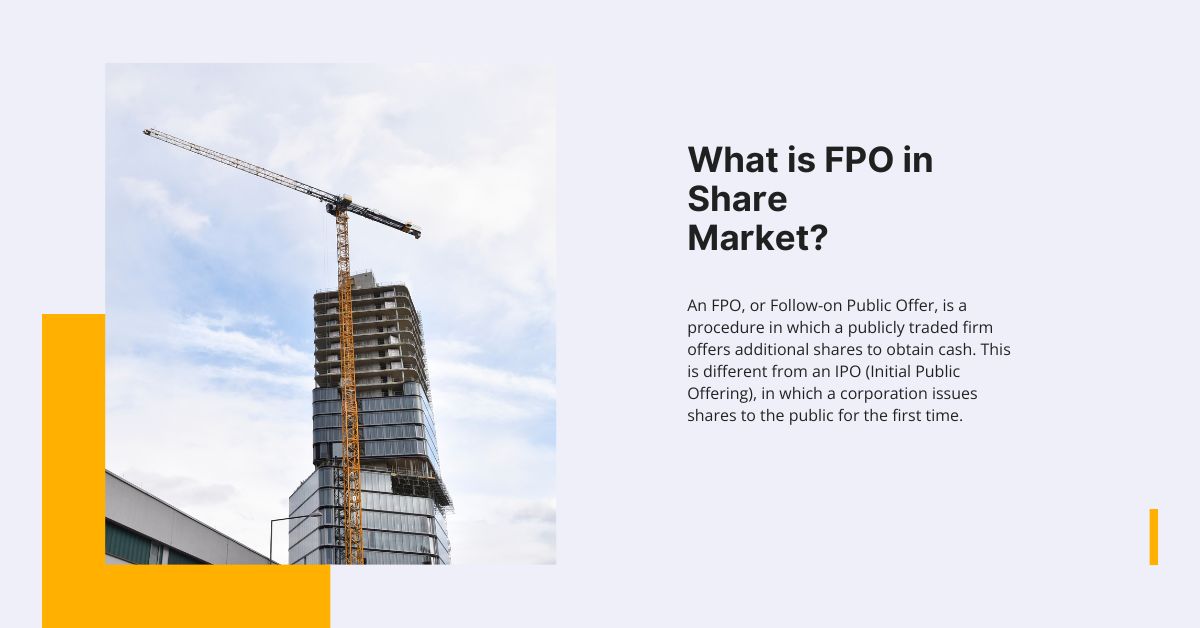Recently, one of India’s largest FPOs was successfully subscribed. Investors profited in the process. If you missed the bus because you were ignorant of the investing opportunity, let us change that. In this article, we cover all you need to know about FPO.
What is FPO in Share Market?

An FPO, or Follow-on Public Offer, is a procedure in which a publicly traded firm offers additional shares to obtain cash. This is different from an IPO (Initial Public Offering), in which a corporation issues shares to the public for the first time.
Companies utilize FPOs to finance growth projects, pay off debt, improve working capital, or diversify their shareholder base. The procedure entails issuing new shares, usually through a book-building process, and selling them to the public at a set price.
Types of FPO
There are primarily two types of FPOs:
-
Dilutive FPO: In this type, the company issues new shares to the public, thereby increasing the total number of outstanding shares. This dilution can impact the existing shareholders’ earnings per share. Companies often use dilutive FPOs to raise capital for expansion, debt reduction, or general corporate purposes.
-
Non-Dilutive FPO: Here, existing shareholders, such as promoters or institutional investors, sell a portion of their shares to the public. This doesn’t increase the total number of outstanding shares, so there’s no dilution effect on existing shareholders’ earnings per share. Non-dilutive FPOs are often used to unlock value or improve liquidity for existing shareholders.
FPO vs IPO
| Feature | IPO (Initial Public Offering) | FPO (Follow-on Public Offering) |
|---|---|---|
| Definition | First-time issuance of shares to the public by a private company | Issuance of additional shares by an already listed company |
| Purpose | Raise capital for growth, expansion, debt reduction, etc. | Raise capital for similar purposes as IPO, but for a company already listed |
| Investor Base | General public, including retail and institutional investors | Existing shareholders and the general public |
| Pricing Mechanism | Often determined through a book-building process | Typically priced based on the company’s current market price |
| Regulatory Process | More stringent and time-consuming due to the initial listing process | Less stringent as the company is already listed |
Advantages and Disadvantages of FPO
| Feature | Advantages | Disadvantages |
|---|---|---|
| Capital Raising | Raises additional capital for expansion, debt reduction, or other corporate purposes | Diluting existing shareholders’ ownership |
| Liquidity | Increases liquidity of the company’s shares | Potential price volatility due to increased supply of shares |
| Investor Base | Broadens the investor base, attracting new shareholders | Dilution of earnings per share (EPS) for existing shareholders in case of a dilutive FPO |
| Market Visibility | Enhances the company’s market visibility and profile | Potential negative market sentiment if the FPO is perceived negatively |
| Regulatory Process | Less stringent regulatory process compared to IPO | Potential for market manipulation or insider trading |
Should You Subscribe for an FPO?
A number of factors influence the decision to subscribe to an FPO. Consider the company’s financial situation, future development possibilities, and the FPO’s objective. If the firm has a solid track record, a bright future, and is using the cash for constructive reasons, it may be a suitable investment prospect.
However, it is critical to undertake extensive research, study the offer pricing, and evaluate the potential hazards. Consulting with a financial expert might also give useful information. Finally, the choice to subscribe to an FPO should be founded on thorough research and personal investing objectives.
Why Does the Company Need FPO?
Companies use FPOs to obtain more cash for a variety of purposes, including supporting efforts to grow, lowering debt, improving working capital, or diversifying their shareholder base.
This helps them to capitalize on growth prospects, increase their financial position, and improve their entire business operations. Companies that issue additional shares to the public can get access to a larger pool of investors and raise the capital they need to fuel their future initiatives.

